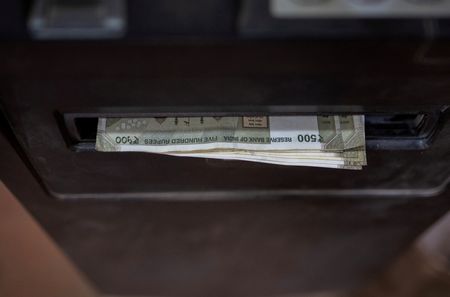By Chibuike Oguh
NEW YORK (Reuters) -The U.S. dollar fell against the yen and Swiss franc on Wednesday after economic data showed weakening labor market conditions, supporting investor expectations of U.S. monetary policy easing by the Federal Reserve.
The U.S. Labor Department said on Wednesday that job openings, a measure of labor market demand, fell more than expected to 7.181 million in July. Economists polled by Reuters had expected 7.378 million job openings in the JOLTS data.
With the Fed focused on the jobs market, the U.S. dollar will continue weakening materially if data continues to show deterioration in labor market conditions, said Eugene Epstein, head of structuring for North America at Moneycorp in New Jersey.
“Between (Fed Chair Jerome) Powell’s dovishness at Jackson Hole regarding the job market and the previous non-farm payrolls being weak and today’s JOLTS being weak, and if Friday’s jobs number is weak, it’s a big dovish dynamic going on. It’s very hard to see any options at all, especially given what’s going on politically with the Fed right now with the current U.S. administration,” Epstein said.
The dollar erased earlier gains against the Japanese yen and Swiss franc following the data. It weakened 0.2% to 148.09 yen and dropped 0.06% to 0.8042 Swiss franc.
The euro added to its gains against the dollar. It was last up 0.14% at $1.165850.
“The jobs openings data showed a further contraction in the number of openings and provided conviction to the labor market part of the equation for the Federal Reserve,” said Amo Sahota, director at Klarity FX in San Francisco. “We didn’t see a huge move in the currency market but I do think what’s notable is that the overnight swap market is now pricing in a U.S. rate cut at 95% for September.”
U.S. Treasury yields fell after the jobs data. The 2-year note yield, which typically moves in step with interest rate expectations for the Fed, fell 4.3 basis points to 3.615%. The benchmark U.S. 10-year note yield fell 6 basis points to 4.217%.
The dollar index, which measures the greenback against a basket of currencies including the yen and the euro, fell 0.24% to 98.165.
The British pound gained against the dollar following a selloff in UK government bonds. In the gilt market, Britain’s 30-year borrowing costs rose to their highest levels since 1998.
Sterling strengthened 0.38% to $1.3442.
The euro fell 0.15% against the pound to 0.8675.
The 30-year Japanese government bond yield hit record highs on Wednesday, further pressuring the yen. The Japanese ruling party’s Secretary-General Hiroshi Moriyama, a close aide to Prime Minister Shigeru Ishiba, announced he intended to resign.
Spot gold hit an all-time high of $3,578.50 amid the selloff in government bonds. In cryptocurrencies, bitcoin gained 0.47% to $111,946.62.
(Reporting by Chibuike Oguh in New YorkEditing by Nick Zieminski, Rod Nickel and Richard Chang)











